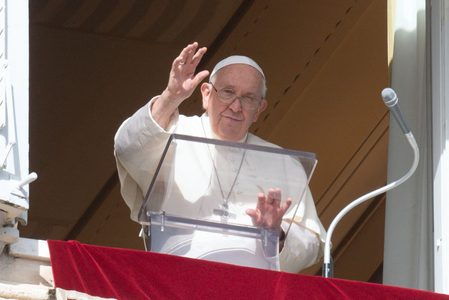SUMMARY
This is AI generated summarization, which may have errors. For context, always refer to the full article.
![[OPINION] Blessing same-sex couples: What it means for LGBTQIA+ Catholics](https://www.rappler.com/tachyon/2024/01/blessings-for-same-sex-couples.jpg)
The document Fiducia Supplicans, recently released by the Dicastery for the Doctrine of the Faith, allows for the blessing of same-sex couples as well as couples in irregular situations.
It stresses that the Catholic Church still upholds its teachings on the sanctity of marriage as a sacrament and institution, as well as its teaching on homosexuality. The document, however, takes on a pastoral approach in its treatment of same-sex couples and couples in “irregular situations” (e.g. Catholics in polygamous marriages, Catholics who are divorced and/or remarried, or Catholics in relationships that are not between a biological male and female).
As two lay theologians, we invite people to reflect on three particular points regarding the document: our understanding of blessings and image of God, our understanding of synodality and subsidiarity within the Catholic Church, and lastly, what the document means for the LGBTQIA+ community here in the Philippines.
What are blessings?
Fiducia Supplicans elaborates on what blessings mean using traditional theological sources: Scripture, Tradition, and human experience. Though still emphasizing that blessings are meant to help what is blessed conform more closely to God, blessings are also a way for people to approach God, whether it be for supplication or adoration and thanksgiving. One of the reasons why a blessing is sought and granted is mentioned in the document: we as people “beg that all that is true, good, and humanly valid in their lives and their relationships be enriched, healed, and elevated by the presence of the Holy Spirit.”
What Pope Francis in this document does is emphasize the relationships of people with each other and with God. Instead of focusing strictly on rules, the document also emphasizes that grace works beyond the rubrics the church has written down, and so the document rightly stresses that “it is essential to grasp the Holy Father’s concern that these non-ritualized blessings never cease being simple gestures that provide an effective means of increasing trust in God on the part of the people who ask for them.”
Thus, when people ask for a blessing, an exhaustive moral analysis should not be placed as a precondition for conferring it. For, those seeking a blessing should not be required to have prior moral perfection.
– Fiducia supplicans
Given Pope Francis’ Jesuit background, the understanding of God in the document reflects an Ignatian understanding of a God who meets people where they are, and wishes to draw people to God’s self through the invocation of blessings on the relationships we have. The document challenges us to see God in all things, and so to ask where is God in the different relationships we and other people have with each other.
Even though the document takes great pains to maintain the importance of the sacrament of marriage and that the ritual blessing there is different from the blessing that will be given to same sex and irregular couples, it also takes greater pains to emphasize that people are people and not just walking sex acts, and that the Christian God is a God of love and relationships, not to be reduced to a God of rubrics.
Reception, subsidiarity, and synodality
While the the Catholic Bishops’ Conference of the Philippines released an advisory on Fiducia Supplicans stating that the document “speaks for itself, and therefore does not require much explanation,” a number of local bishops have released guidelines for their own dioceses. The language used for these local guidelines departs from Fiducia Supplicans and adds an extra layer of moral judgment upon couples asking for blessings.
Archbishop Socrates Villegas, for example, argues that when a priest blesses these couples, he is “asking God to have pity on both of them and to give them the grace of conversion so that they can regularize their relationships.” The tone and language of Villegas presumes a need for conversion, for same-sex couples to “regularize” their relationships – not found in Fiducia Supplicans. In another case, Archbishop Ricardo Baccay of Tuguegarao described these couples not as “couples in irregular situations,” as was phrased in Fiducia Supplicans, but as “persons in problematic and difficult situations.”
The guidelines being drawn up by bishops seem to ignore the emphasis in recent years on synodality and subsidiarity within the Catholic Church. A synodal church invites a close listening to the people who are most affected by a decision made by the church. This is a listening to what the Catholic Church calls the “sense of the faithful” that reflects how the Christian faith is embodied and practiced in the context of the people. The principles of solidarity and subsidiarity in Catholic theology holds that the church is to pursue the common good, especially for those who are vulnerable and marginalized, and those who are most affected by any teaching/decision must have the most say in the process leading up to the teaching/decision.
The pastoral invitation of Fiducia Supplicans extends towards being and listening with the couples who seek for blessings, and to listen to their voices. In all church teachings on homosexuality, queer voices have been pushed aside time and time again. Queer lives have become an object of discourse without their voice being heard in the discussion, which does not align with the principle of subsidiarity the Catholic Church advocates for.
Rather than relying heavily on rubrics, the document highlights the need as well for us to learn to discern depending on particular circumstances: “It is not appropriate for a Diocese, a Bishops’ Conference, or any other ecclesial structure to constantly and officially establish procedures or rituals for all kinds of matters…. Canon Law should not and cannot cover everything, nor should the Episcopal Conferences claim to do so with their various documents and protocols, since the life of the Church flows through many channels besides the normative ones.”
What does this mean for LGBTQIA+ Catholics?
Given all these ideas in the document, what does this mean for the Catholic Church moving forward?
This document gives hope for a more inclusive church that welcomes couples from different situations. The invitation to clergy is to create those spaces of welcome, one blessing at a time. Further down the line, this can even open the doors for a more robust and inclusive LGBTQIA+ ministry that affirms the goodness of each person. However, because of the way bishops can receive teaching from the Pope, there will be significant differences in how the teaching will be put into practice, as seen in how the different local dioceses are crafting their own guidelines, juxtaposed with bishops and priests in other countries who are willing to or have already blessed same sex couples.
Fiducia Supplicans reminds us of the Filipino saying “malayo pa, pero malayo na.” Certainly this document is a step forward in becoming more synodal, dialogical, and communal, grounded in Scripture and Tradition. – Rappler.com
Stephanie Ann Puen, PhD, is a faculty member at the Department of Theology at Ateneo de Manila University. She has taught economics and business ethics, Catholic social thought, gender and sexual ethics, and theology and popular culture at both the Ateneo de Manila University, and Fordham University in New York, as well as published on these topics for both scholarly and popular publications.
Raphael Yabut is a faculty member at the Department of Theology at Ateneo de Manila University. He is a PhD candidate at Boston College, MA, USA, currently writing his dissertation on a religious education for peace and justice in grassroots communities in the Philippines and is interested in researching on queer and post/decolonial theologies.
Add a comment
How does this make you feel?

![[The Wide Shot] Peace be with China](https://www.rappler.com/tachyon/2024/07/wideshot-wps-catholic-church.jpg?resize=257%2C257&crop=311px%2C0px%2C720px%2C720px)
![[OPINION] A critique of the CBCP pastoral statement on divorce](https://www.rappler.com/tachyon/2024/07/TL-cbcp-divorce-statement-july-19-2024.jpg?resize=257%2C257&crop=285px%2C0px%2C722px%2C720px)


![[The Wide Shot] Was CBCP ‘weak’ in its statement on the divorce bill?](https://www.rappler.com/tachyon/2024/07/cbcp-divorce-weak-statement.jpg?resize=257%2C257&crop=258px%2C0px%2C719px%2C720px)













There are no comments yet. Add your comment to start the conversation.